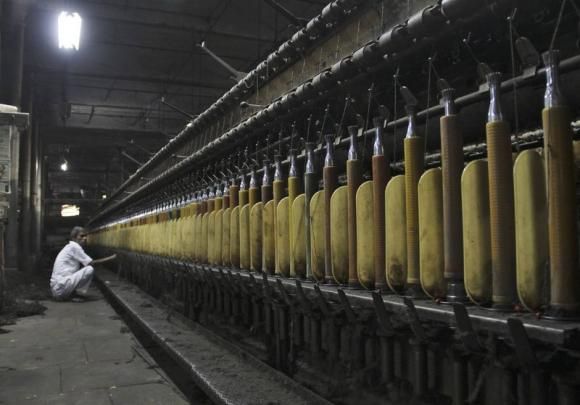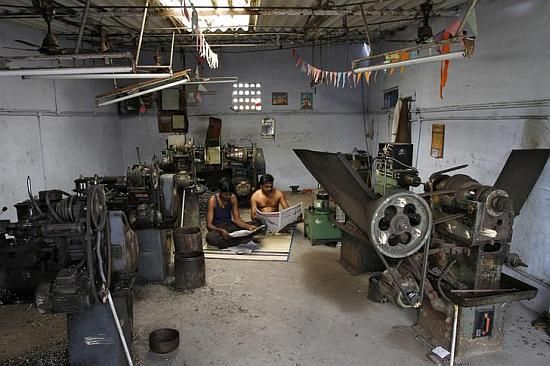At British India Corporation's textile factory in Kanpur, four men sit in a control room watching computerised gauges eight hours a day. When they are done, another group takes over, and then another, for 24 hours a day – much as they might at any major industrial plant.

The problem is, nothing is produced there.
The strange tale of British India Corporation is an example of how political patronage and India's strict labour laws keep publicly owned companies going long after they are insolvent.
Now Prime Minister Narendra Modi, who campaigned in this year's general election on a promise of "minimum government, maximum governance", is preparing to invest more taxpayer money in ailing state-owned factories in a bid to turn them around.
While the government has announced the closure of six publicly owned companies, Minister for Heavy Industries and Public Enterprises Anand Geete said last month that about two-thirds of 64 loss-making firms can be revived with more money.
The government has set up a committee to examine ways sick public companies can be resuscitated, including using cash reserves from profit-earning state firms to provide lifelines to the loss-making ones, according to officials in New Delhi.
The committee will report its findings in two months.
The moves have disappointed those who want Modi to force through economic reforms, however painful. He might reply that past success in reviving "zombie" enterprises as chief minister of Gujarat state gives him the right to try on a national level.
"I am shocked they are considering putting more money in," said Mohan Guruswamy, chairman of the Centre for Policy Alternatives and a former official in the finance ministry.
"The litmus test of whether Modi is a reformer is what he does with these companies, not what he does on allowing more foreign investment. Unfortunately, it looks like he will avoid taking unpopular decisions."
Since winning India's first parliamentary majority in three decades in May, Modi has not been as ambitious as his supporters would like in introducing policies many say are needed to revive an economy growing at its slowest rate in nearly a decade.
So far, there has been little movement to roll back the previous government's subsidy programmes or repeal a law allowing retroactive taxation that has alarmed global investors.
"Possibly the worst company in the world"
In theory, British India Corporation sells army uniforms, rugs, blankets and tweed jackets, but it stopped manufacturing nine years ago after finishing its last order.
Since then, the company, based in the gritty northern city of Kanpur, has lost about $50 million.
British India Corporation employs about 1,800 people. All the employees come to work, everyone gets paid, earns a bonus, there are overtime shifts, promotions and job changes.
There are bungalows for the managers, flats for workers, a hospital, schools and a subsidised shop. The gardeners, engineers and painters keep the grass trimmed, the machines in working order, and signs freshly painted.
"This could easily be the worst-run company in India, maybe the world," said Satyendra Nath, 58, head of the tax department, who spends his days reading the newspaper or watching television because there is no work to do. "Often, I think: what have I done in a previous life to end up working here?"
India put key industries in the hands of state-run monopolies in the years after independence in 1947, borrowing from Soviet thinking that late-industrialising countries needed to use state intervention to transform their economies.
.jpg?w=670&h=900)
A quarter of the country's 277 state-run firms, which produce everything from condoms to scooters, have lost about $16 billion over the last decade, according to government records.
At least 20 loss-making companies owned by the central government have stopped production or have almost no activity yet still pay staff full salaries, according to an official at the Board for Financial and Industrial Reconstruction, the agency charged with expediting restructuring or liquidation.
Indian ministers are reluctant to close these zombie companies because it will lead to job losses, which in turn could cost them votes.
India's labour laws, which the World Bank says are the most restrictive anywhere, also make it hard to sack staff for any reason other than criminal misconduct. So it can take decades for a severance package to be agreed.
For India, which has the world's highest number of starving children and people who can't read, paying the factories' running costs and salaries diverts money that could be spent on healthcare and education.
However, Modi may adopt a plan for the loss-making state companies he used in Gujarat, where he was chief minister.
By giving boards more independence from ministers and using cash injections from the government, Modi was able to turn 20 publicly owned companies into profit in his 13 years as leader of the state.
"When Modi came to power in Gujarat he was determined to revamp the public sector companies, a majority of them were making losses," said P.K. Laheri, the former top bureaucrat in Gujarat who served as chairman of some of those state companies. "He did not want his ministers or politicians to play an active role in running them."

Good for nothing
British India Corporation, which hasn't made a profit since 1989, is among the companies being earmarked for revival, officials in New Delhi said.
To pay off its debt and buy materials to restart production, the company would need an investment of $65 million, according to managers at the factory.
At the company's redbrick mills, where there is a four-sided clock tower built a century ago and silver weaving machines line the long factory floors, millions of dollars of never-used equipment sits decaying; a symbol of the mismanagement that has mired the company in crisis.
In 2005, after a $13 million taxpayer rescue, the factory managers spent the money on high-end weaving machines imported from Switzerland.
But the plan to raise another $21 million by selling land to buy yarn and wool was never approved by the politicians so the machines have never been turned on.
Still, at 6:30 every morning, workers begin arriving for their shifts. Once the personnel department marks their attendance, they hang around talking with friends, complete odd jobs such as cleaning, or return home to see their families.
Employee Chandra Lal, 55, who has worked at the factory since 1987, says some of his colleagues have become alcoholics as they struggle to deal with the boredom. He says they are unlikely to find new jobs after years of inactivity.
"I have forgotten how to use my arms," Lal said. "Earlier we were respected members of our community. Now we are good for nothing, just like the factory."












 © 2025
© 2025